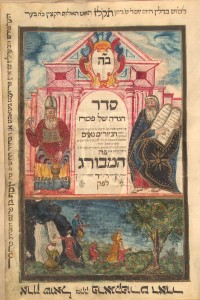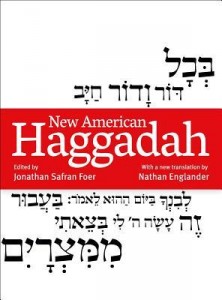Short Fuse: On Pesach
A new Haggadah has recently been published, the New American Haggadah, edited by Jonathan Safran Foer and translated by Nathan Englander. It’s getting a lot of attention and some criticism from “elders.” But maybe the Haggadah is beside the point.
Pesach.
I remember inveighing against Haggadot. My line was that all Torah enjoins us to do is eat a few foods and talk about bondage and freedom, as per deliverance from Mitsrayim.
I used to say the Haggadot just consist of some instructions and helpful hints for doing that. But instead of doing that, we recite Haggadot! (It’s like you get instructions for building a bookcase but instead just chant the instructions.)
That particular take led to a good concentrated Seder at least one time.
What is bondage? What is freedom? Ok, eat. Back to bondage, freedom, drink and eat.
But it’s an amazing tale, Exodus. I don’t think any of it ever happened. I don’t think Jews were ever slaves in the land of Egypt. (Very respected Israeli archeologists have proven that to the satisfaction of many.*) That only makes the book better and deeper and more amazing.
I think of it as pertaining not to the slave labor of Jewish stone masons in Mitsrayim but to the labor of 100 Phillip Roths and David Grossmans and IB Singers and Kafkas etc. chained together and ordered (by Hashem?) to cooperate to tell this profound story.
They don’t always cooperate. Strange things stick out. (E.g., things
happen to the feet of the fleeing Jews as they cross the opened Red Sea.
Blisters, bites, etc. Does anybody talk about that? It’s believed that
Kafka tried but was overruled.)
Anyway, it’s not a smooth story.
So much to ponder and worry about.
(Let me for a moment be pedantic and say so much of Torah is so compressed that it seems to be devised precisely in order to be expanded upon, uncompressed, over the eons.)
Perhaps I will at least adhere to my old minhog of reading the book again.
There’s a new Haggadah here, the New American Haggadah edited by
Jonathan Safran Foer and translated by Nathan Englander. It’s getting a lot of attention and some criticism from “elders.” ** But again, the Haggadah is not the story, is it? The story is in Torah. And such a story.
So maybe the whole argument about this new Haggadah is wrong. Pesach is what you do with Pesach. A Seder is what you do with a Seder. It is not a liturgy—unless you want it to be.
* The Bible Unearthed: Archaeology’s New Vision of Ancient Israel and
the Origin of Its Sacred Texts by Israel Finkelstein and Neil Asher.
Silberman, 2001.
** Leon Wieseltier frowns upon it so mightily (in the current Jewish
Review of Books) that even the word “Hashem,” a perfectly normal way
for Jews to refer to God, disturbs him. “Is it just me,” he asks,
absurdly, “or does that make God seem like an Arab?” It’s probably
safe to say it’s just Wieseltier who thinks “Arab!” when he hears
“Hashem.”



“After 10 centuries of this talk you would think someone would finally say what we all secretly know: The Haggadah has been retranslated, reillustrated, reannotated, and reissued so often because its readers are perpetually dissatisfied with it. No matter how you dress it up the core of the book, its story, simply is not executed well.”
that’s from Avi Steinberg’s review of the New American Haggadah.
http://www.bostonglobe.com/arts/books/2012/04/05/new-american-haggadah-once-again-fails-tell-passover-story-well-new-haggadah-again-fails-tell-passover-story-well/kpniJBPCB8k9BemPgu1qFM/story.html
the map is not the territory. the territory of exodus, steinberg argues, is in torah.